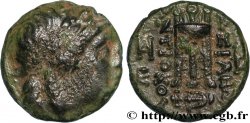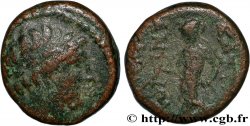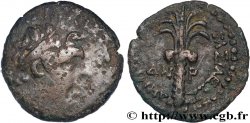bgr_293864 - SYRIA - SELEUKID KINGDOM - ANTIOCHOS III THE GREAT Hemichalque
недоступный.
Товар уже продан в нашем интернет-магазине (2013)
Цена: : 280.00 €
Товар уже продан в нашем интернет-магазине (2013)
Цена: : 280.00 €
Тип Hemichalque
Дата: an 150
Монетный двор / Город: Tyr, Phénicie
Металл: copper
Диаметр: 15 mm
Ориентация осей монеты: 12 h.
Вес: 2,68 g.
Редкость: R3
Комментарии о состоянии
Exemplaire sur petit flan, bien centré des deux côtés. Beau portrait d’Antiochus III de frappe un peu molle. Très joli revers inhabituel bien venu à la frappe. Patine marron, légèrement granuleuse
Лицевая сторона
Аверс: легенда: ANÉPIGRAPHE.
Аверс: описание: Tête diadémée (tainia) d’Antiochus III à droite ; grènetis circulaire.
Обратная сторона
Реверс: Описание: Massue posée verticalement accostée de deux petits dauphins divergeants.
Реверс: легенда: BASILEWS - ANTIOCOU.
Комментарий
Notre exemplaire semble de très bon style par rapport à celui reproduit sur les planches du Seleucid Coins (pl. 89). Notre exemplaire est de très bon style et semble de la plus grande rareté.








 Cообщить об ошибке
Cообщить об ошибке Распечатать страницу
Распечатать страницу Отправить мой выбор
Отправить мой выбор Задать вопрос
Задать вопрос Consign / sell
Consign / sell
 Информация
Информация



